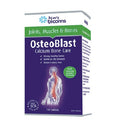

Description
Strong bones & teeth
A concentrated source of Calcium and other vitamins and minerals that can assist in maintaining healthy strong bones and teeth.
Osteoporosis
Henry Blooms OsteoBlast may assist in the prevention and treatment of osteoporosis.
Growth and development
Henry Blooms OsteoBlast contains 10 essential vitamins and minerals vital for growth and development of bones.
A number of vitamins and minerals are required to make and maintain healthy bones. These include:
Calcium: an essential nutrient that is required for strong bones and for supporting the body’s critical functions including blood pressure, heartbeat and nerve conduction. Ninety-nine percent of the body’s Calcium is stored in the bones and teeth. When dietary Calcium intake is too low, the body will take the Calcium it needs from the bones. Over time, if more Calcium is taken out of the bones than is put in, then this can result in thin and weak bones or osteoporosis.
Magnesium: involved in Calcium transport and can affect bone resorption and mineralisation.
Copper: slows bone turnover by inhibiting osteoclast activity.
Manganese: required for the development of the skeleton (bones). It has been observed that, Manganese levels are lower in women with osteoporosis.
Zinc: vital for growth and development. Deficiency can result in growth retardation as well as reduced osteoblast activity and the synthesis of collagen and chondroitin.
Boron: can have anti-osteoporotic activity and can affect Calcium and Vitamin D metabolism. It can also increase the effect of oestrogen on bone – oestrogen has osteoprotective effects.
Silicon: required for healthy connective tissue, bones and teeth.
Vitamin D: assists in the absorption and re-absorption of Calcium. It is particularly important for the development of the skeleton and bone mineralisation. Vitamin D deficiency can lead to softening of the bones. It also increases the mobilisation of stem cells to become osteoblasts.
Vitamin K1 & K2: activates Osteocalcin, a protein produced by osteoblasts that attracts Calcium to bones. High dietary intake of Vitamin K can reduce the risk of fractures in women.
INGREDIENTS
Each tablet contains:
Calcium: 500 mg
Hydroxyapatite 50 mg
Carbonate 450 mg
Vitamin D3 (Colecalciferol) 500IU 12.5 mcg
Vitamin K1 (Phytomenadione) 23 mcg
Vitamin K2 (Menaquinone 7) 45 mcg
Magnesium (as oxide) 114.61 mg
Manganese (as gluconate) 2.5 mg
Zinc (as oxide) 5 mg
Copper (as gluconate) 800 mcg
Boron (as borax) 1 mg
Silicon (as dioxide) 7.25 mg
No added gluten, yeast, milk derivatives, salt, lactose, artificial colours, flavours and preservatives.
INSTRUCTIONS
Adults & children: Take 1 tablet, twice daily with food (morning & evening).
For best absorption do not consume more than 500 mg of Calcium at any one time. If symptoms persist consult your healthcare practitioner.
Cautions & Interactions
For best absorption, it is recommended to take Calcium supplements 2 hours before or after taking iron supplements.
Some people who take Calcium supplements complain about constipation. The best way to prevent constipation is to eat more fibre in your diet from fruits, vegetables, and whole grain products, as well as to drink 6 to 8 glasses of water each day. Also, Calcium interferes with the body’s ability to use certain antibiotics. Do not take Calcium supplements (or eat calcium-rich foods) at the same time as antibiotics. Vitamin D is contraindicated in those who have hypercalcemia and those with evidence of Vitamin D toxicity. Dosages of up to 60 mcg rarely cause adverse effects; however, dosages of over 100 mcg may cause hypercalcemia.
High Calcium intakes consumed on a regular basis may be harmful. It is important to get your daily recommended Calcium and not to consume more than 2500 milligrams of Calcium per day. The adverse effects of excessive Calcium intake may include high blood Calcium levels, kidney stone formation and kidney complications.
Pregnant or breastfeeding
Women who are pregnant or breastfeeding should not exceed the upper tolerable limit of 3200IU (80 mcg) of Vitamin D.
